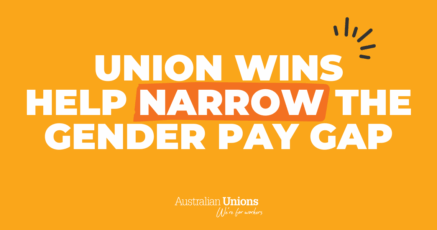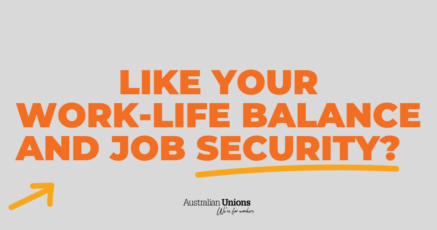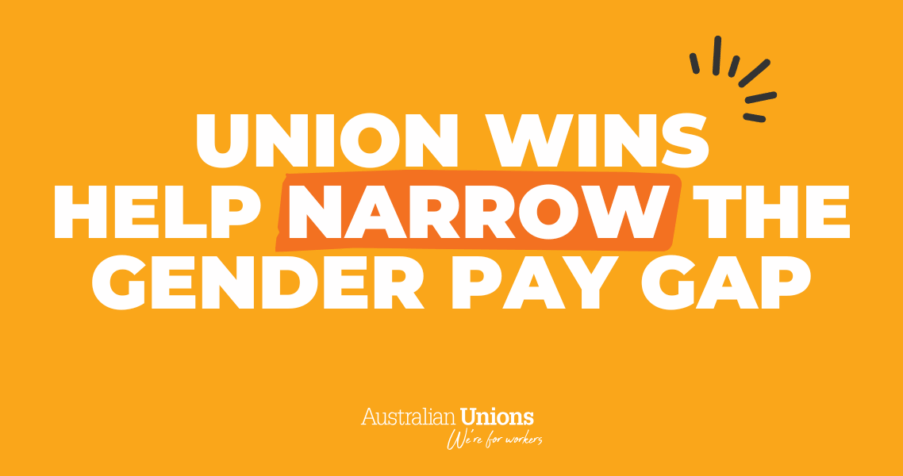Often when International Women’s Day (IWD) comes around each year, it’s easy to feel defeated in the face of ongoing gender inequality. But this year feels a little different.
There is always support available. For 24 hour 7 day mental health support call:
- Lifeline – 13 11 14
- Beyond Blue – 1300 22 4636
- Suicide callback service – 1300 659 467
Speaking to crowds of women at 2022 IWD, ACTU secretary Sally McManus said, “History only gets us there if we walk there or if we’re pushing there. It’s not going to happen by itself.”
And she wasn’t kidding. During the 12 months since last IWD, union members have kicked goals to improve the lives of working women – here are how eight of those changes may well affect you.
1. Introduced 10 days paid family and domestic violence leave into the National Employment Standards
After a union-led campaign spanning a decade, 10 days paid family and domestic violence leave is finally an entitlement for all employees. With $18,000 as the average cost of fleeing a domestic violence situation, the leave provides crucial support to victim-survivors. The leave is already available to all employees, except for those in businesses with less than 15 employees.
2. Expanded of paid parental leave from 20 weeks to 26 weeks by 2026
Bumping up paid parental leave from 20 weeks to 26 weeks will help decrease the gender pay gap. How? One of the reasons for the existence of the gap is that women are more likely to take parental leave.
But only 20 weeks of that leave can be paid, thus leaving women who need more time with their child without pay. Multiply that with each child, and you’re looking at a notable difference in earnings. The extra six weeks is the first step of many union members will take to balance out the care load for working parents.
3. Strengthened Equal Pay laws
The Fair Work Commission (FWC) uses Equal Remuneration Orders (EROs) to ensure workplaces provide equal pay for work of equal or comparable value. Previously, the FWC weren’t obliged to give out EROs to workplace where there was unequal pay between genders but thanks to unions leading the way to new work laws, they do now.
4. Strengthened the right to request flexible work
You’d think the pandemic would have changed things but for many workers, it’s still incredibly difficult to set up flexible work arrangements. After 6 June 2023, workers who are pregnant or are experiencing family violence have the right to flexible work requests. It will also become more difficult for employers to refuse flexible work requests from other types of employees.
5. Outlawed pay secrecy clauses in contracts which increases the gender pay gap
The clauses in contracts that banned workers from discussing their pay with colleagues will be no more. Pay secrecy contributed to the gender pay gap and any new contracts won’t be allowed to contain pay secrecy clauses. Bye bye!
6. Required employers to take all reasonable steps to eliminate sexual harassment
Despite beginning the Respect@Work campaign under a sexist Morrison Government, union members persevered so workers would be better protected from sexual harassment at work. Now with the new measures in place, employers have a duty to take the initiative in preventing sexual harassment in their workplaces.
7. Improved gender pay gap reporting
Right now a Bill is in parliament that, if passed, will make sure companies with 100 or more employees reveal how much they are paying their workers. A whole heap of working women may be about to find out how much less they’re earning compared to their male counterparts.
8. Won the right to bargain for special measures to achieve substantive equality
‘Special measures’ are more commonly referred to as ‘positive discrimination’ – this is when changes are made to provide equal opportunity to certain groups that face greater discrimination such as Aboriginal and Torres Strait Islander people, women and parents. Now, due to new laws brought about after union pressure, it has been made clear that workers can now negotiate with their employer for ‘special measures’ to be included in their enterprise agreement.
And it doesn’t stop there
Watch this space. Union members have some huge plans on the horizon to kick even more goals for 2023.
If you’re already part of a union, you’ll already be involved in the campaign for super on paid parental leave and the YES campaign for an Aboriginal and Torres Strait Islander Voice to Parliament – and if you’re not already involved, but would like to be, chat to your union. Both of these things will change women’s lives across Australia.
Does working towards gender equality sound like something you care about? Then being in your union is the best place for you to make sure it happens.
All those eight moments of progress have come about because union members have come together to create fairer workplaces. It’s the same reason why we have rights today like sick leave, annual leave, penalty rates and even weekends.
Union members are building fairer and safer workplaces for today – and tomorrow.






SHARE:
Unions lead with front foot forwards for International Women’s Day